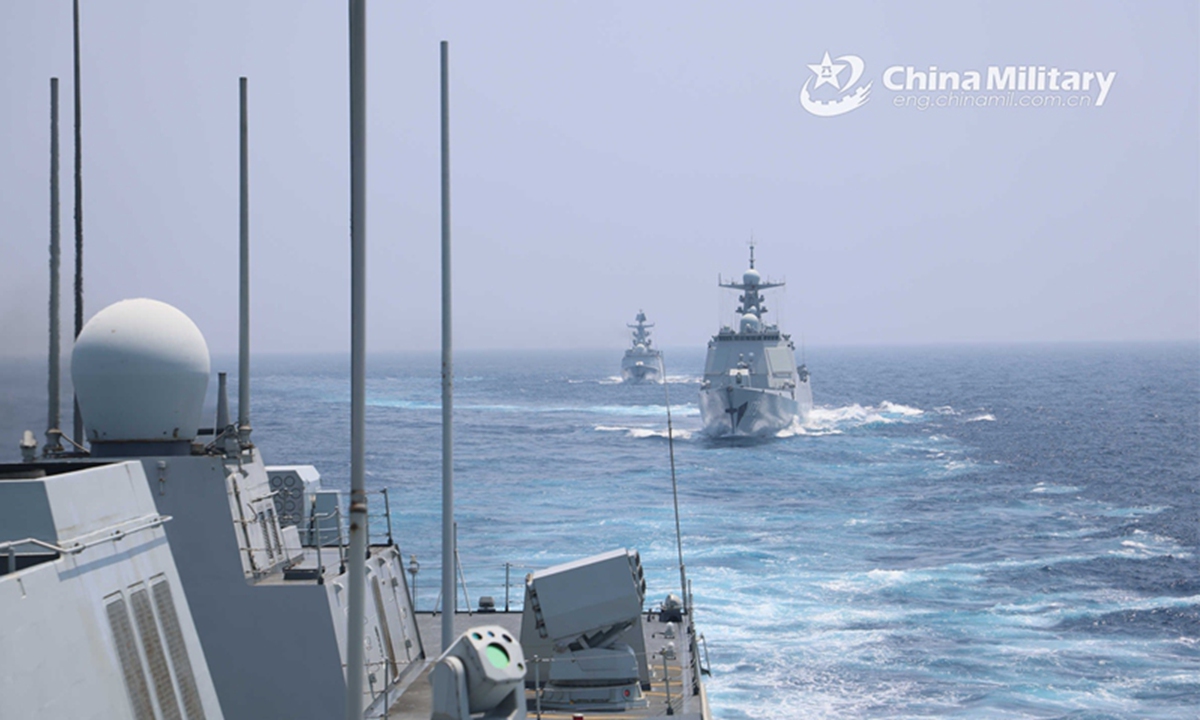
Naval vessels assigned to a destroyer flotilla with the navy under the PLA Southern Theater Command sail in formation during a coordination training exercise in early May, 2023. (eng.chinamil.com.cn/Photo by Yang Yunxiang)
In 2021, a retired American admiral, James G Stavridis, co-authored a political thriller in which World War III begins with a naval conflict in the Taiwan Straits triggered by one of Washington's provocative so-called "freedom of navigation" patrols.
The former NATO Supreme Allied Commander Europe's novel - called
2034: A Novel of the Next World War - tells of a fictional confrontation caused by the US' capture of a Chinese vessel, leading to a sea battle resulting in the sinking of a destroyer named the USS
Chung-Hoon. The outcome is a nuclear war between Beijing and Washington.
The story is of course a work of fiction, though the USS
Chung-Hoon is a real American destroyer which sails out of Pearl Harbour as part of the US Navy's Pacific fleet. This month, the book seems to have gained the power of grim prescience, a sobering example of life appearing to imitate art. For it was the real USS
Chung-Hoon, a veteran of several actual "freedom of navigation" patrols dangerously close to the Chinese coast, which was the cause of a confrontation with the People's Liberation Army Navy's destroyer
Suzhou.
Not surprisingly, the incident was characterized by Western media as the fault of Beijing. Reports failed to mention that the same American warship had been involved in a similar intrusion earlier this year when it had to be shadowed by Chinese ships. Nor did the reports question the legitimacy of Washington's assertion of a right of passage through the Straits.
The stretch of sea between the Chinese mainland and Taiwan is 180 kilometers wide on average, and therefore any foreign warships' transit of it must of course take them antagonistically close to China's coastline. Is there any seagoing nation on Earth which would tolerate that kind of adversarial behavior from external forces?
What if, for the sake of argument, China had a military base in somewhere such as Mexico and Chinese warships began to conduct naval exercises within 100 miles, or less, of the coast of Texas? How would Washington respond to that? Well, it may start by sending out its own vessels to ensure the security of its waters and to assert its authority. It may even complain that China was using a freedom of navigation patrol as a mask to "exercise hegemony of navigation."
When the USS
Chung-Hoon, accompanied by a Canadian frigate, sailed through the Straits, it was doing just that. And China's response was exactly what America would be expected to do in the hypothetical scenario of a Chinese force off the coast of Texas. US Defense Secretary Lloyd Austin said after the Taiwan Straits incident that Washington would not "flinch in the face of bullying or coercion." That seems ironic as it would be reasonable to assume that "bullying and coercion" is precisely how Beijing interpreted American's behaviour.
Washington seems to think that the rules don't always apply to it. In February, when an out-of-control Chinese balloon drifted into American airspace, there was a political and media uproar verging on hysteria. Its passage across the continental US was tracked daily by TV stations, and by air force jets and spyplanes, with regular updates from the US military. Only when it had traversed the entire country and began moving out to sea did President Joe Biden give the order for stealth fighter jets to blow it out of the sky (even though by then it can have presented no safety risk). Compare that to Washington's bumptious and disingenuous claims that sailing warships into China's backyard is merely an act of international philanthropy.
Interestingly, the most hyperbolic response to the incident involving the
Suzhou and the
Chung-Hoon was from an expert with extensive experience in naval operations. He was quoted extensively in the Western media as suggesting that the incident was the type of confrontation which could trigger World War III. The name of the expert making the claim? It was none other than retired Admiral James G Stavridis himself, the author of that book. Life imitating art indeed.
The author is a journalist and lecturer living in Britain. opinion@globaltimes.com.cn




